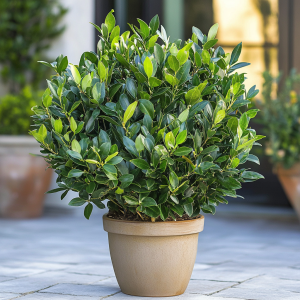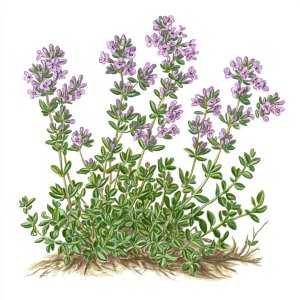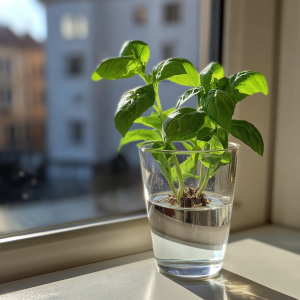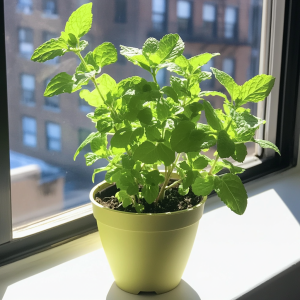
Bay leaves are definitely a preppers friend inside and outside the kitchen
Imagine a world where your kitchen doubles as a survival kit, where the fragrant leaves on your windowsill are not just culinary delights but also potent medicinal allies. Welcome to the aromatic universe of a prepper’s herb garden – a green pharmacy and gourmet pantry rolled into one. In this verdant realm, peppermint doesn’t just freshen your breath; it’s a digestive lifesaver. Rosemary isn’t merely a poultry seasoning; it’s a cognitive booster. And that innocent-looking basil? It’s a flavor bomb and an inflammation fighter in disguise.
As we embark on this herbal journey, we’re not just talking about spicing up your apocalypse menu. We’re unveiling the secrets of a self-sustaining, health-promoting, flavor-enhancing arsenal that fits right on your kitchen counter. And for those who think prepping is all about stockpiling canned goods, prepare to have your taste buds revolutionized. On October 22nd, “The Magnificent Pantry: Whipping Up Delicious Delights with Shelf-Stable Magic” hits the shelves, proving that with the right herbs and some shelf-stable ingenuity, even the most basic provisions can transform into gourmet fare. I use several of these herbs in the cookbook so this is a great roadmap of herbs to grow.
In this article, I explore just a handful of basics that meet both the culinary minimal for my kitchen as well as some of their medicinal benefits. There are many more medicinal herbs that I would have in my garden for sure!
One of the most exciting aspects of herb cultivation for preppers is the ability to grow certain herbs in water. This method is perfect for those with

Thyme is great for culinary and medicinal purposes
limited space or in situations where soil might not be readily available. Peppermint, basil, rosemary, cilantro, lavender, marjoram, and chives all thrive in water, each offering unique culinary and medicinal benefits. Peppermint, with its refreshing zing, soothes digestive issues and eases cold symptoms. Basil, essential for Italian cuisine, boasts anti-inflammatory properties. Peppermint also repels rodents! Rosemary, imparting a piney flavor to dishes, may enhance memory. Cilantro adds fresh flavor to various cuisines while aiding digestion. Lavender promotes relaxation and adds a floral note to desserts. Marjoram enhances meat dishes and supports digestive health. Chives provide a mild onion flavor and are rich in vitamins and minerals.
While these herbs can be propagated or even grown in water, some prefer the stability and nutrient profile of soil. Thyme, sage, parsley, and bay leaves fall into this category. Thyme enhances soups and stews with its earthy flavor and possesses antimicrobial properties. Sage adds a savory note to poultry and pork dishes and may enhance cognitive function. Parsley, rich in vitamins, is a versatile garnish that supports kidney function. Sometimes, the dish doesn’t look complete without the parsley. Bay leaves impart a subtle flavor to soups and stews and have anti-inflammatory properties and are great for long-term storage of grains and they keep pantry moths away.

Basil can grow just in water.
To make the most of your prepper’s herb garden, consider some key cultivation tips. For water-grown herbs, change the water regularly to prevent algae growth and provide fresh nutrients. Most herbs require ample sunlight, so if growing indoors, consider using grow lights to supplement natural light. Regular harvesting encourages bushier growth; cut herbs in the morning after the dew has dried for the best flavor. Learning various methods of preserving herbs, such as drying or freezing, can extend their usefulness beyond the growing season.
Companion planting is another valuable technique for maximizing your herbal arsenal. This practice involves planting compatible herbs together to promote healthy growth and efficient use of space. For instance, basil and parsley make excellent companions for each other, with basil helping to repel flies and mosquitoes. Rosemary and sage grow well together, both preferring drier soil conditions. Chives can be planted with cilantro, as they have similar water requirements and growth habits. Thyme and lavender are drought-tolerant Mediterranean herbs that thrive in similar conditions. By strategically pairing your herbs, you can create a more robust and productive garden.
By incorporating these herbs into your prepper’s pantry, you’re not just ensuring flavorful meals in times of need; you’re also stocking a natural medicine cabinet. The versatility of these plants, especially those that can be grown in water, makes them invaluable resources for any prepper. As you explore the world of herb cultivation, don’t forget to pick up “The Magnificent Pantry: Whipping Up Delicious Delights with Shelf-Stable Magic” when it releases on October 22nd. This cookbook will provide you with HUNDREDS of shelf-stable recipes and innovative ways to use your home-grown herbs alongside shelf-stable ingredients, elevating your prepper cuisine to new heights.
Remember, in the world of preparedness, knowledge and resourcefulness are your greatest assets. By mastering the art of herb cultivation, you’re not

Peppermint helps curb carbohydrate cravings, mental alertness and is a great addition to desserts
just gardening; you’re cultivating resilience, health, and a touch of gourmet magic for whatever the future may hold. Whether you’re growing herbs in water on your windowsill or nurturing a soil-based garden, these aromatic plants offer a sustainable way to enhance both your meals and your well-being. With a little care and creativity, your herb garden can become a cornerstone of your prepper strategy, providing fresh flavors and natural remedies year-round.


